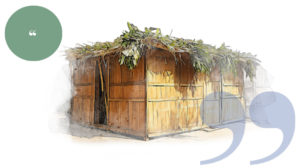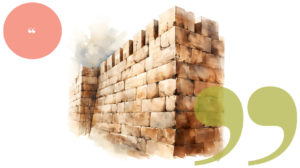HE’S NOT MINE

Kids are kids — they have to go through all sorts of stages and experiences in order to grow up

You’ve seen those parents on the street and in the stores: they’re threatening their child, grabbing him roughly, dragging him along while he screams in protest. “What kind of parent is that?” you wonder. “Hasn’t he/she ever taken a parenting class? That’s no way to treat a precious neshamehla!”
And you go back to the business of parenting your own kids, applying all that you read and hear, nurturing each one with careful, loving attention. All of them till now have been cooperative. You’ve complimented yourself on your brilliant parenting techniques. “If only others would do it my way, they’d also have well-behaved children,” you’ve thought in your heart.
That is, until number eight was born (or whomever) — the child that broke the mold. Nothing you’ve done with the others is working with this one. Your patience, your encouragement, your positive feedback — none of it makes a difference. This child laughs in your face as he hangs from the rafters. Going shopping with him is a nightmare. You’ve become one of “those” parents — if only to save the youngster’s life. Without your firm hand upon him, he’d be running off with some stranger or sitting alone in the middle of the parking lot. You’re tearing the hairs out of your sheitel.
Out-of-Control Experiences
Were you the kind of person who enjoyed amusement park rides? If so, parenting is the job for you! With its ups and downs, sudden curves, dark tunnels, and endless surprises, it offers the “ride” of a lifetime. And, the feeling of being a helpless passenger just adds to the excitement. There’s nothing you can do!
Of course, you’re not really totally helpless in parenting. This is because there are some aspects of parenting that are practical and functional — more like a subway ride than a roller coaster. With these parts of the job, you pay for your ticket, get on the train, and go to where you want to go. For instance, you sign the child up for school, take him there each day, and let him receive an education. That was in your control. If Hashem wants the rest of the experience to unfold uneventfully for you, it will. But if not, it won’t. Perhaps the child will excel or perhaps he will have learning problems or behavioral problems. That’s the part that’s not in your control; that’s the roller coaster part of child development.
Similarly, you can put your child to bed, but you can’t make her go to sleep. You can take her to the birthday party, but you can’t make her play with the other children. You can teach her how to use her words, but you can’t ensure that she won’t slap, grab, or stab the other kids. You can teach your teenager about the evils of substance abuse and yet you can’t follow him around to supervise his moment-to-moment activities. In short, you can offer love, guidance, and discipline, but you can’t make a child benefit from your interventions. This reality is less obvious with those kids who respond “according to the book.” Unfortunately, many children haven’t read the book. So you do what you can, but ultimately, you learn that can’t live in your child’s body and control his or her thoughts, feelings, and actions. As in so many other areas of life, you must learn to deal with your helplessness. You pour your heart out to Hashem.
When Your Child Embarrasses You
Because you can’t ensure that your child will behave appropriately, there will be times when your child’s behavior will mortify you. Little kids can cause big embarrassments. And big ones can seriously frighten, humiliate, and dismay their parents. This is true even when the parents themselves are exemplary people. The personal suffering may be intensified when the parents know for a fact that things they’ve done or said have actually exacerbated the problem. For instance, it’s bad enough to know that your child has called the teacher a name and worse still, if you know that the child is only copying what you do at home!
How do parents cope with their children’s public displays of bad behavior? Many, of course, want to hide in their houses and never go out again. Others have a philosophy that allows them to hold their heads high despite the shenanigans of their offspring: “kids are kids — they have to go through all sorts of stages and experiences in order to grow up; it’s normal and expected that they will behave badly. As long as I’m not the one biting my peers, I don’t have to feel ashamed.” This sort of philosophy allows parents to tolerate the unacceptable and even outrageous behaviors of their children as part of the normal developmental process. Each child is on his journey, just as we all are.
(Originally featured in Family First, Issue 189)
Oops! We could not locate your form.










